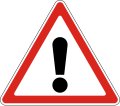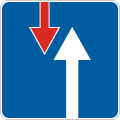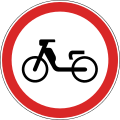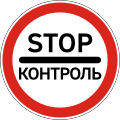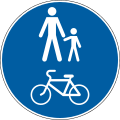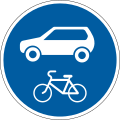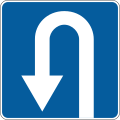Road signs in Ukraine
Road signs in Ukraine are governed by a combination of standards set out by the Vienna Convention on Road Signs and Signals, the European Union (EU), and Ukraine Transport and Roads Agency. Ukrainian signs are similar to the signs of other post-Soviet states and are set out in 7 separate categories based on meaning: warning, priority, prohibitory, mandatory, information, service, and additional plates.[1]
The state importance roads have different indexes, each standing for the respective letter in Cyrillic.
Ukrainian road signs were used in the Autonomous Republic of Crimea and Sevastopol before their occupation and subsequent annexation by Russia in 2014. After the annexation of the Crimean peninsula by Russia, Ukrainian road signs began to be removed and replaced with Russian ones.[2] In some cases, road signs in Ukrainian were removed from Crimea, while in others the text was changed from Ukrainian to Russian, including the names of settlements.
After the Russian invasion of Ukraine was started on February 24, 2022, Ukravtodor began to remove road signs as they could be used by invading Russian forces to find their way around the country. Ukravtodor also posted an edited photo of a standard road sign in which directions to nearby cities have been replaced with Russian-language profanities.[3][4] In the territories of the Kherson and Zaporizhzhia Oblasts occupied by Russia in 2022, Ukrainian-language road signs were removed by the Russians and replaced with Russian-language ones.
Standardisation
On January 1, 1980, the standard GOST 10807-78 was introduced in the Soviet Union. In August 1991, after Ukraine gained independence from the Soviet Union, the standard GOST 10807-78 continued to operate until it was replaced by the Ukrainian standard DSTU 2586-94 in 1995.[5][6] With the adoption of the standard DSTU 2586-94 new road signs appeared in addition to those used in the Soviet Union before its collapse in 1991.
On January 1, 2003 the standard DSTU 4100-2002 was introduced, replacing the standard DSTU 2586-94 according to the decree of the State Standard of Ukraine.[7][8]
On July 1, 2015 the standard DSTU 4100-2014 was introduced, replacing the standard DSTU 4100-2002 according to the order of the Ministry of Economy of Ukraine No. 1484 dated December 29, 2014.[9][10]
On November 1, 2021, a new standard DSTU 4100:2021 for road signs in Ukraine was introduced, replacing the standard DSTU 4100-2014.[11] According to this standard, signs will be easier to read, and their accumulation is prohibited. The main difference is that the names of settlements will have a different font and will be capitalized, not uppercased. There is also a new typeface, called Road UA, that will be used. The new standard provides:
- Layout of road signs of individual design according to the new principle;
- The text must begin with a capital letter;
- Arrows have a new shape;
- European symbols are used to indicate the center of the settlement and the river;
- Defined clear proportions and distances between the elements, depending on the size of the capital letter, which is chosen based on the location of the sign and the category of the road;
- Transliteration of names of settlements is provided.
In addition, this standard will have a new designation of diagonal pedestrian crossings and a new sign for safety islands. Signs and signs to road signs for the development of cycling infrastructure will also be updated.
Warning signs
Warning signs (Ukrainian: Попереджувальні знаки) are an upward-pointing red triangle, with white backgrounds and black pictograms. Yellow backgrounds are used for temporary dangers or roadworks conditions. Signs may include additional plates detailing the danger, who the signs apply to, or other necessary information.
- 1. Warning signs
-
Curve to the right
-
Curve to the left
-
Double curve, first to right
-
Double curve, first to left
-
Chevron right
-
Chevron left
-
T Chevron
-
Chevron right
-
Chevron left
-
Chevron right
-
Chevron left
-
Road narrows on both sides
-
Road narrows on the right
-
Road narrows on the left
-
Steep climb
-
Steep descent
-
Unprotected quay of riverbank ahead
-
Tunnel ahead
-
Uneven road
-
Hump
-
Dip
-
Slippery road
-
Loose road surface
-
Dangerous shoulder
-
Falling rocks
-
crosswinds area
-
Low-flying aircraft
-
Roundabout
-
Tramway crossing
-
Crossroad with priority (give way to vehicles coming to the right)
-
Intersection with a minor road
-
Minor road on right
-
Minor road on left
-
Staggered crossroads with first on right
-
Staggered crossroads with first on left
-
Traffic lights
-
Drawbridge
-
Two-way traffic
-
Railway crossing ahead that is protected by automatic gates
-
Railway crossing ahead that is not protected by automatic gates
-
Railroad crossbuck (single-track)
-
Railroad crossbuck (multi-track)
-
Countdown beacon to railroad crossing on right side of road (240 meters to crossing)
-
Countdown beacon to railroad crossing on right side of road (160 meters to crossing)
-
Countdown beacon to railroad crossing on right side of road (80 meters to crossing)
-
Countdown beacon to railroad crossing on left side of road (240 meters to crossing)
-
Countdown beacon to railroad crossing on left side of road (160 meters to crossing)
-
Countdown beacon to railroad crossing on left side of road (80 meters to crossing)
-
Pedestrian crossing ahead
-
Children
-
Bicycle crossing
-
Cattle crossing
-
Deer crossing
-
Roadworks
-
Traffic queues
-
Other dangers
-
Change of road surface type
-
Accident area
Priority signs
Priority signs (Ukrainian: Знаки пріоритету) regulate the movement of vehicles in an orderly fashion. The priority road sign tells drives that they have priority at all intersections ahead on the road until the end sign. The traffic bottleneck signs are used where the road is too narrow to permit vehicles to pass side-by-side, but rather must alternate.
- 2. Priority signs
-
Priority road
-
End of priority road
-
Give priority to oncoming traffic
-
Priority over oncoming traffic
Prohibitory signs
Prohibitory signs (Ukrainian: Заборонні знаки) regulate the use of the road based on movement, classes of vehicles, or other restrictions.
- 3. Prohibitory signs
-
Road closed to all vehicles
-
No cars
-
No trucks
-
No vehicles with trailers
-
No tractors
-
No motorcycles
-
No mopeds
-
No bicycles
-
No pedestrians
-
No handcarts
-
No horse-drawn carts
-
No vehicles carrying dangerous goods
-
No vehicles carrying explosives and flammable goods
-
No vehicles carrying substances to cause water pollution
-
No vehicles over 7 tonnes
-
No vehicles over 5 tonnes per axle
-
No vehicles wider than 2.7 meters
-
No vehicles higher than 3.5 meters
-
No vehicles longer than 10 meters
-
Drivers must maintain a distance of at least 70 meters
-
No entry
-
No right turn
-
No left turn
-
No U-turn
-
No overtaking
-
End overtaking prohibition
-
No overtaking by trucks
-
End overtaking prohibition for trucks
-
Speed limit
-
End of speed limit (limit reverts to default for road class)
-
Speed limit zone
-
End of speed limit zone (limit reverts to default for road class)
-
No honking to all vehicles
-
No stopping
-
No parking
-
No parking on odd-numbered days
-
No parking on even-numbered days
-
No parking zone
-
End of no parking zone
-
Stop at customs
-
Stop for other control
-
End of all restrictions and prohibitions
-
Stop for dangers, including traffic accidents, natural disasters or other road obstructions
Mandatory signs
Mandatory signs (Ukrainian: Наказові знаки) instruct drivers on actions they must take or obey, or may mark types of vehicles permitted to use the road.
- 4. Mandatory signs
-
Go straight only
-
Turn right only
-
Turn left only
-
Proceed straight or turn right
-
Proceed straight or turn left
-
Turn left or right (no straight ahead)
-
Keep right
-
Keep left
-
Keep right or left
-
Roundabout
-
Road for movement of passenger cars
-
Minimum speed limit
-
End of minimum speed limit
-
End of bicycle path
-
Bicycle and pedestrian path
-
Adjacent bicycle and pedestrian paths
-
Adjacent pedestrian and bicycle paths
-
Equestrian path
-
Vehicles carrying dangerous goods may proceed straight ahead only
-
Vehicles carrying dangerous goods may turn right only
-
Vehicles carrying dangerous goods may turn left only
-
Traffic using anti-slip chains
-
End of traffic using anti-slip chains
-
Combined cars vehicles and bicycles traffic
-
End of combined cars vehicles and bicycles traffic
Information signs
Information signs (Ukrainian: Інформаційно-вказівні знаки) describe conditions of the road and area that do not require a danger warning, mandatory instruction or prohibition.
-
Expressway begins
-
Expressway ends
-
Road for motor vehicles begins
-
Road for motor vehicles ends
-
One-way street begins
-
One-way street ends
-
Rightward one-way street
-
Leftward one-way street
-
One-way street with reverse lane for buses
-
One-way street with reverse lane for buses ends
-
Rightward one-way street with reverse lane for buses
-
Leftward one-way street with reverse lane for buses
-
Lane for buses begins
-
Lane for buses ends
-
Reversible Lane begins
-
Reversible Lane ends
-
Crossing the reversible lane
-
Mandatory direction of lanes
-
Narrowing of a lane
-
Narrowing of a lane
-
Mandatory direction of a lane
-
Narrowing of a lane with vehicle class restriction
-
Additional lane on the right begins
-
Additional lane on the left begins
-
Right lane ends
-
Left lane ends
-
Right lane merges with traffic coming from other road
-
Lane on the right begins with traffic coming from other road
-
Lane closed, proceed into oncoming lane
-
Do not enter to oncoming lane, return to your lane
-
Emergency escape lane for runaway vehicles
-
U-turn place
-
U-turn zone
-
Trucks proceed straight only
-
Trucks proceed right only
-
Trucks proceed left only
-
Dead-end street
-
Dead-end street on the left
-
Dead-end street on the right
-
Advisory speed
-
Residential zone
-
Residential zone ends
-
Pedestrian zone
-
Pedestrian zone ends
-
Pedestrian crossing (placed on right side of road)
-
Pedestrian crossing (placed on left side of road)
-
Diagonal pedestrian crossing
-
Stairway down
-
Stairway down
-
Stairway up
-
Stairway up
-
Parking
-
Parking
-
Parking for trucks
-
Parking zone
-
Parking zone ends
-
Bus stop
-
Bus stop ends
-
Tram stop
-
Tram stop ends
-
Trolleybus stop
-
Trolleybus stop ends
-
Taxi stop
-
Settlement begins
-
Settlement ends
-
Village begins
-
Village ends
-
Built-up area begins
-
Built-up area ends
-
National speed limits (used at border crossings with other countries)
-
Other road restrictions (such as for a mountainous road ahead)
-
Route guide sign with destinations
-
Route guide sign with destinations
-
Route guide sign with destinations
-
Route guide sign with destinations
-
Route guide sign with destinations
-
Route guide sign with destinations
-
Destinations sign with distances
-
Destinations sign with distances
-
Alternative route to meet your destination where left turn is prohibited
-
Alternative route for closed road
-
Detour route on straight
-
Detour route on right
-
Detour route on left
-
Street name sign
-
River name sign
-
New road signs ahead
-
Airport
-
Train station
-
Bus station
-
Church (may include name or religious denomination)
-
Factory
-
Traffic cameras area
-
Sea (river) port or station
-
Expressway begins (toll/payment required)
-
Expressway ends (toll/payment required)
-
Bicycle and pedestrian zone
-
Bicycle and pedestrian zone ends
-
Bicycle crossing (placed on right side of road)
-
Bicycle crossing (placed on left side of road)
-
Entrance to a road with one-way traffic and an oncoming bicycle lane (right)
-
Entrance to a road with one-way traffic and an oncoming bicycle lane (left)
-
Area of dimensional and weight control
-
End of area of dimensional and weight control
Service signs
Service signs (Ukrainian: Знаки сервісу) mark the way to road services that may be required by the driver. They may include arrows, distances to, or names of the service.
- 6. Service signs
-
First point of medical care
-
Hospital
-
Emergency phone call
-
Fire extinguisher
-
Mechanic
-
Car wash
-
Gas station
-
Filling-only gas station
-
Electric vehicle charging station
-
Gas station with mixed services
-
Gas station combined with a charging station
-
Gas station combined with a charging station
-
Gas station combined with a charging station
-
Calling phone
-
Information base
-
Traffic police
-
Bathroom area
-
Drinking water
-
Restaurant or an lunch
-
Cafeteria refreshments
-
Rest area
-
Hotel or motel
-
Tourist base
-
Camping grounds
-
Caravan parking
-
Camping grounds with caravan parking
-
Route for pedestrians
-
Beaches or pools
-
National historic/cultural/tourist site
-
Tire fitting
Additional plates
Additional plates (Ukrainian: Таблички до дорожніх знаків) provide extra information about the sign above it.
- 7. Additional plates
-
Above sign indicating a distance in 300 meters
-
Above sign indicating a distance to Stop in 250 meters (placed below the give way sign to warn of a stop sign)
-
Above sign indicating a distance in 300 meters to the left
-
Above sign indicating a distance in 100 meters to the right
-
Above sign indicating a length in 100 meters
-
Above sign indicating where stopping and parking prohibited in length in 30 meters on right side
-
Above sign indicating where stopping and parking prohibited in length in 25 meters on left side
-
Above sign indicating where stopping and parking prohibited in length in 10 meters
-
Above sign indicating where no stopping and parking ends
-
Above sign indicating of object on the right
-
Above sign indicating of object on the left
-
Above sign indicating where no stopping and parking in both directions
-
Above sign indicating of object on both sides of road
-
Above sign indicating a time during Saturdays, Sundays and holidays
-
Above sign effective during working days
-
Above sign effective during weekdays
-
Above sign effective during times
-
Above sign effective during Saturdays, Sundays and public holidays during times
-
Above sign effective during working days during times
-
Above sign effective during weekdays during times
-
Above sign applies to trucks/heavy goods vehicles
-
Above sign applies to vehicles pulling trailers
-
Above sign applies to motor vehicles
-
Above sign applies to buses
-
Above sign applies to farm vehicles/equipment
-
Above sign applies to motorcycles
-
Above sign applies to bicyclists
-
Above sign applies to vehicles carrying dangerous goods
-
Park parallel to curb
-
Park straddling curb (when minimum distance is possible)
-
Park on sidewalk (when minimum distance is possible)
-
Park perpendicular to curb
-
Park on sidewalk (when minimum distance is possible)
-
45° degree parking
-
No idling during parking
-
Diagram of road priority
-
Above sign applies to this lane only
-
Number of curves in road
-
Approach to ferry
-
Above sign applied during winter conditions
-
Above sign applies during percipitation
-
Toll/payment required
-
Raised viewing platform for cars
-
Blind pedestrians may be crossing
-
Disabled parking
-
Above sign does not apply to disabled persons
-
Maximum duration of parking
-
Temperature limit
-
Other danger: frontal collision area
-
Other danger: rear-end collision area
-
Other danger: collision with pedestrian likely
-
Other danger: collision with cyclist likely
-
Other danger: rollover area
-
Other danger: this section of road passes near ski slopes or trails, or other winter sports areas
-
Safety island
-
Road marking
-
Direction of movement of cyclists
-
Direction of movement of cyclists
-
Direction of movement of cyclists
-
Direction of movement of cyclists
-
Direction of movement of cyclists
-
Direction of movement of cyclists
Retired signs
There are images of retired road signs, some of them are no longer used. However, the Soviet-style road signs and the typeface specified in the Soviet GOST 10807-78 standard may still be used in inscriptions despite the fact that the modern DSTU 4100:2021 is adopted.
-
No vehicles over 7 tonnes (1991–2021)
-
No vehicles over 5 tonnes per axle (1991–2014)
-
No vehicles longer than 10 meters (1991–2021)
-
Drivers must maintain a distance of at least 70 meters (1991–2021)
-
Proceed straight only (1991–2021)
-
Turn right only (2014–2021)
-
Turn right only (1991–2014)
-
Turn left only (1991–2014)
-
Turn left only (2014–2021)
-
Proceed straight or turn right (1991–2021)
-
Proceed straight or turn left (1991–2021)
-
Turn left or right (no straight ahead) (1991–2021)
-
Keep right (1991–2021)
-
Keep left (1991–2021)
-
Keep right or left (1991–2021)
-
Direction of roundabout traffic (1991–2021)
-
Pedestrian path (1991–2021)
-
Minimum speed limit (1991–2021)
-
Motorway begins (1991–2021)
-
Motorway ends (1991–2021)
-
U-turn zone (1991–2021)
-
Settlement begins (1994–2021)
-
Settlement ends (1994–2021)
-
Village begins (1994–2021)
-
Village ends (1994–2021)
-
Other road restrictions (such as for a mountainous road ahead) (1994–2021)
-
Street name sign (1994–2021)
-
River name sign (1994–2021)
-
Destinations sign with distances (1994–2021)
-
Lane for buses begins (2002–2021)
-
Lane for buses ends (2002–2021)
-
Additional lane on the right begins with minimum speed limit for left lane (2002–2021)
-
Advisory speed (2002–2021)
-
Pedestrian zone (2002–2014)
-
Pedestrian zone ends (2002–2014)
-
National speed limits (used at border crossings with other countries) (1994–2021)
-
Route guide sign with destinations (1994–2021)
-
Route guide sign with destinations (1994–2021)
-
Route guide sign with destinations (1994–2021)
-
Road distance interval marker (1994–2021)
-
Road route number sign (2002–2021)
-
Road route number sign (2002–2021)
-
Stop (used where a regular stop sign is not needed, such as unprotected railway crossings) (1994–2021)
-
First point of medical care (2002–2021)
-
Hospital (2002–2021)
-
Traffic police (1994–2021)
-
No vehicles over 5 tonnes per axle (2014–2021)
-
End of speed limit (limit reverts to default for road class) (2014–2021)
-
Route guide sign with destinations (2014–2021)
-
Detour route on straight (2014–2021)
-
Detour route on right (2014–2021)
-
Detour route on left (2014–2021)
-
Destinations sign with distances (2014–2021)
-
New road signs ahead (2014–2021)
-
Above sign applies to vehicles carrying dangerous goods (2014–2021)
-
Above sign enters force on date (1994–2002)
-
Above sign enters force on date (2002–2021)
-
Green wave (2020–2021)
See also
- Comparison of European traffic laws
- Comparison of European road signs
- Traffic sign
- Vienna Convention on Road Signs and Signals
References
- ^ "PDD.UA". Government of Ukraine. Retrieved 2013-06-06.
- ^ "В Крыму велели убрать украинские дорожные знаки". BBC News Русская служба (in Russian). 2014-06-24. Retrieved 2023-02-07.
- ^ "Ukraine roads company removing road signs to confuse Russians". Reuters. 2022-02-27. Retrieved 2023-10-31.
- ^ Bella, Timothy (2022-02-26). "Ukrainian agency, urging removal of road signs, posts fake photo with a colorful message for Russia". The Washington Post.
- ^ "ДСТУ 2586-94". Словари и энциклопедии на Академике (in Russian). Retrieved 2023-04-21.
- ^ "ГОСТ 10807-78". Словари и энциклопедии на Академике (in Russian). Retrieved 2023-04-21.
- ^ "ДСТУ 4100-2002 Знаки дорожні. Загальні технічні умови. Правила застосування" (PDF). pdd.com.ua.
- ^ "ДСТУ 4100-2002 Знаки дорожні. Загальні технічні умови. Правила застосування". Будстандарт.
- ^ "Про прийняття нормативних документів України та пробних національних стандартів України, гармонізованих з міжнародними нормативними документами, міжнародного та європейських стандартів як національних стандартів України, затвердження національних стандартів України, скасування національних стандартів України та міждержавних стандартів в Україні". Офіційний вебпортал парламенту України (in Ukrainian). Retrieved 2023-04-10.
- ^ "В Украине вступила в силу новая редакция стандарта дорожных знаков". Автоцентр.ua (in Russian). 2015-07-10. Retrieved 2023-04-10.
- ^ "New Standard of Road Signs". DerzhdorNDI SE. Retrieved 22 October 2023.





















































